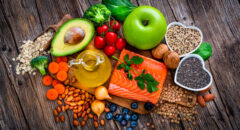
When your doctor sits you down to explain that your cholesterol levels are high, your mind might ask: What does this mean for my health? How did this happen? What even is cholesterol, anyway? It’s a lot to process, but understanding the basics can make it easier to take action.
What is Cholesterol?
Cholesterol is a waxy, fat-like substance found in every cell of your body. It plays several essential roles, such as helping your body produce hormones, vitamin D, and bile acids that aid in digesting fats. In short, cholesterol is not inherently bad—it’s actually vital for your body to function properly.
Your liver naturally produces all the cholesterol your body needs. The problem arises when your diet introduces excess cholesterol, particularly the “bad” kind, which can lead to health complications over time.
Why is High Cholesterol Dangerous?
Excess cholesterol, particularly low-density lipoprotein (LDL), can build up in your arteries, forming plaques. Over time, these plaques can narrow or block your blood vessels, increasing your risk of heart disease, stroke, and other cardiovascular issues.
On the other hand, high-density lipoprotein (HDL) is the “good” cholesterol. It helps remove LDL from your bloodstream, reducing the risk of blockages.
Foods High in Cholesterol to Watch Out For
While your body produces cholesterol naturally, certain foods can contribute to elevated levels, particularly those high in saturated fats, trans fats, and dietary cholesterol. Common culprits include:
- Eggs (especially the yolks)
- Shellfish (lobster, shrimp, crab legs, mussels, etc.)
- Butter
- Liver
- Cheese
- Red meat
- Desserts (cakes, cookies, pastries)
- Ice cream
- Bacon
- Soy-based processed products
These foods, when consumed in excess, don’t just affect your cholesterol levels—they can also lead to weight gain, inflammation, and other health complications. Moderation and balance are key.
RELATED: 7 Easy Ways To Keep Your Cholesterol In Check
8 Natural ways to lower cholesterol
If you’ve been diagnosed with high cholesterol or simply want to keep your levels in check, there are several natural strategies you can adopt. These lifestyle changes can help lower LDL cholesterol and improve your overall health.
Quit Smoking.

Smoking is a major contributor to heart disease, and it negatively impacts cholesterol levels. Quitting can lead to significant improvements:
- Within 20 minutes of quitting, your blood pressure and heart rate normalize.
- After three months, your circulation and lung function improve.
- After one year, your risk of heart disease drops to half that of a smoker.
The benefits extend beyond cholesterol control, making quitting one of the most impactful changes you can make for your health.
RELATED: Good vs. Bad Cholesterol: 4 Types to Watch to Avoid Heart Problems
Drink Alcohol Only in Moderation.

Excessive alcohol consumption can elevate cholesterol levels and lead to serious health problems, including high blood pressure, heart failure, and stroke.
The key is moderation:
- For women of all ages and men over 65: Up to one drink daily.
- For men 65 and younger: Up to two drinks per day.
Moderate alcohol consumption, particularly red wine, has been associated with increased HDL cholesterol, but the risks of overconsumption far outweigh the benefits.
Exercise and Increase your Physical Activity.

Physical activity has a powerful effect on cholesterol levels. Exercise can:
- Increase HDL cholesterol (the “good” kind).
- Lower LDL cholesterol (the “bad” kind).
- Improve weight management, which directly impacts cholesterol levels.
How to Get Started:
- Aim for at least 30 minutes of moderate exercise, five days a week, or 20 minutes of vigorous aerobic activity, three times a week.
- Incorporate activities like brisk walking, cycling, swimming, or playing sports.
- Even short bursts of activity—like taking the stairs or parking farther away—can add up.
Increase Soluble Fiber.

Soluble fiber reduces the absorption of cholesterol into your bloodstream. Foods high in soluble fiber include:
- Oatmeal and oat bran
- Legumes (kidney beans, lentils, chickpeas)
- Fruits (apples, pears, oranges)
- Vegetables (Brussels sprouts, carrots)
Adding more of these foods to your diet can make a significant difference in your cholesterol levels.
RELATED: 7 Ways To Lower Your Cholesterol Every Time You Eat
Reduce Saturated Fats.

Saturated fats, commonly found in red meat and full-fat dairy products, raise LDL cholesterol. By cutting back on these foods, you can help lower your overall cholesterol levels.
Healthier Alternatives:
- Choose lean cuts of meat or plant-based protein sources.
- Opt for low-fat or fat-free dairy products.
- Use heart-healthy oils like olive or avocado oil in place of butter.
Eat Foods Rich in Omega-3 Fatty Acids.

Omega-3 fatty acids don’t directly lower LDL cholesterol, but they offer several other heart-healthy benefits, such as reducing blood pressure and inflammation.
Sources of Omega-3s:
- Fatty fish (salmon, mackerel, sardines)
- Walnuts
- Flaxseeds and chia seeds
- Canola oil
Including these foods in your diet can complement other cholesterol-lowering strategies.
Eliminate Trans fats.

Trans fats are a double threat: they increase LDL cholesterol while decreasing HDL cholesterol. Although the FDA banned trans fats in 2018, some processed foods may still contain trace amounts due to certain manufacturing practices.
Check Labels For:
- Partially hydrogenated oils
- Processed snacks like cookies, crackers, and frozen meals
To minimize trans fat consumption, focus on whole, unprocessed foods whenever possible.
RELATED: 5 Truths About Cholesterol Most Black People Don’t Know…
Add whey protein.

Whey protein, a byproduct of dairy, has been shown to lower LDL cholesterol and total cholesterol while also reducing blood pressure. It can be consumed as a supplement or through foods like yogurt and other dairy products.
How to Incorporate Whey Protein:
- Mix whey protein powder into smoothies or shakes.
- Opt for Greek yogurt or milk fortified with whey protein.
Whey protein is an easy addition to your diet and offers a host of other nutritional benefits.
Managing cholesterol doesn’t have to mean overhauling your life overnight. Small, consistent changes—like eating more fiber-rich foods, exercising regularly, and cutting back on saturated fats—can add up to big improvements over time.
Remember, cholesterol levels are just one part of the bigger picture of your health. Regular check-ups, a balanced diet, and an active lifestyle can help keep your heart strong and your body thriving. Take charge of your health today, and enjoy the rewards of a healthier tomorrow.








